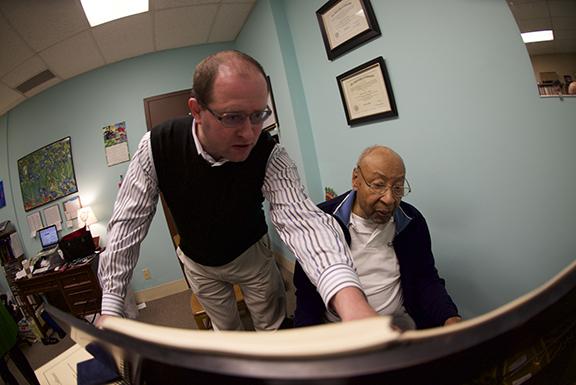
The Glenn Korff School of Music will present the North American premiere of composer Robert Owens’ opera titled “Culture! Culture!” on Friday, Aug. 7 at 7:30 p.m. in the Studio Theatre, located on the first floor of the Temple Building at 12th and R sts.
Tickets are free, but must be reserved in advance. Free tickets are available on the Johnny Carson School of Theatre and Film tickets website at http://go.unl.edu/theatretix. The fully staged chamber opera will be accompanied by piano.
The performance is a culmination of Assistant Professor of Voice Jamie Reimer’s eight-year collaboration with Owens to study his music and bring it to a wider audience.
“This is sort of the cherry on top for me,” Reimer said. “I’ve always loved his vocal music, and I knew that this opera existed and have sung and given lectures on it. But it’s been this natural and organic evolution of this relationship I’ve been building since 2007.
The performance will be the North American premier of the opera, which Owens wrote in Hamburg, Germany, in 1961 and premiered in Ulm, Germany, in 1970.
Associate Professor of Bassoon Jeff McCray is the musical director and will be conducting, and Hixson-Lied Professor and Director of Opera William Shomos is stage directing. Students, faculty, alumni and community members will be in the cast.
Owens, who is nearly 90 years old, was on campus in March to work with students in the Glenn Korff School of Music on his music and plans to return for the performance in August.
“My music, there are certain things you have to know about in the way of singing it,” Owens said. “I’m very excited and very pleased [UNL is performing it]. It hasn’t been performed since 1970 in Germany.”
Reimer said her colleagues were eager to participate.
“A lot of these students know Robert and my work with him,” Reimer said. “A lot of them have met and worked with him on previous visits. We have so many tremendous musicians in this school and in this community who want to sing. That spirit of doing something new with a living composer is so invigorating that when the opportunity presented itself, everyone jumped on board. I think it shows off the best of what we do here. Someone finds a great project, and everyone says yes, let’s go for it.”
Owens was born in the U.S. in 1925 and grew up in California. His mother, Alpharetta Helm-Owens, was a pianist, and Owens began playing the piano himself at age four, composing at age eight and performing publicly at age 10. After serving in the military, he continued his musical studies in Paris at L’Ecole Normale de Musique under renowned pianist Alfred Cortot.
After teaching in the U.S. for two years, he returned to Europe in 1959 to live and work in Germany, where he is a composer, pianist and stage actor.
The opera’s plot centers on the intersection of the artist and the business of making music.
“The focal figure is a tenor, Paul, who is on the brink of a spectacular career, and he’s discovering that his time is being spent less on the making of music, and more on the business of music,” Reimer said. “And it’s the process by which he does or does not work through that in the pursuit of his career.”
The subplot involves Tobias, a composer, who has written what he thinks is his life’s masterpiece, an oratorio. He desperately wants Paul to sing it.
“And by means of lots of plot devices, they end up together intoxicated in a bar talking about this,” Reimer said. “Paul not knowing that Tobias is a composer, and Tobias knowing Paul is a famous and gifted tenor. There’s a love interest for Tobias, and a very overbearing producer and manager that try to manipulate the situation for their benefit. It’s universal to anyone who is trying to make great art, and it’s a little scathing of those that assist in the making of great art.”
Owens is glad Reimer took an interest in his work.
“Jamie got to know my story,” he said. “That someone has the interest is gratifying. I don’t write music for the masses. What I write for is humanity and good musicians. It’s really for singers.”
The performance is made possible with support from the Nebraska Arts Council and Hixson-Lied Endowment.
More details at: http://unltheatretickets.universitytickets.com/user_pages/event_listings.asp